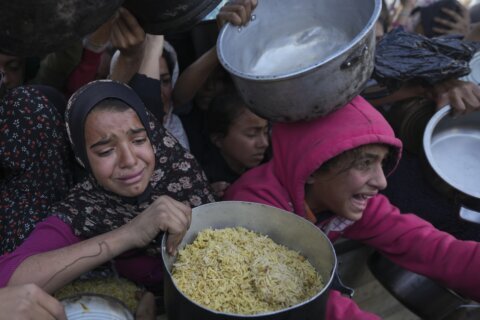MELBOURNE, Australia (AP) — Violence among illegal miners in Papua New Guinea has left between 20 and 50 people dead, a United Nations official said Monday.
The fighting started days ago and is continuing in the Porgera Valley, near the site of a landslide in May estimated to have killed more than 2,000 people, according to the South Pacific island nation’s government.
The U.N.’s humanitarian adviser for Papua New Guinea, Mate Bagossy, said the death toll of at least 20 as of Sunday was based on information from community members and local authorities in Enga province in the nation’s mountainous inland.
“We have confirmed that at least 20 people have been killed, but as per the last news that I have, it’s likely up to 50 people,” Bagossy told The Associated Press. “The fighting is continuing.”
“Today some security forces have started moving in … so it remains to be seen what effect this will have,” Bagossy said, referring to the army and police.
Bagossy did not have information on the numbers wounded.
Papua New Guinea police did not respond to a request on Monday for tallies of dead and wounded in the valley.
National Police Commissioner David Manning said an emergency had been declared on Saturday after the violence escalated, with police mobilizing to protect residents and infrastructure.
“The deteriorating situation has been caused by illegal miners and illegal settlers who are victimizing traditional landowners and using violence to terrorize local communities,” Manning said in a statement.
The nearby New Porgera gold mine has halted most of its operations because of the violence until at least Thursday.
“Over the past 24 hours a significant escalation in tribal fighting has impacted many of our local employees. Homes have been destroyed, family and friends injured or killed, and people have been unable to sleep while living in fear,” New Porgera General Manager James McTiernan said in a statement on Sunday.
“I am incredibly saddened by these devastating events and sincerely hope that the government will soon restore peace to the valley,” McTiernan added.
Enga Governor Peter Ipatas described the violence in the valley as unprecedented.
“This situation is dire. We have witnessed innocent lives being claimed and properties destroyed within days. The current situation can’t continue,” Ipatas said in a statement.
A disaster management team led by the national government and the U.N. Development Program will meet in the national capital, Port Moresby, on Tuesday to coordinate a humanitarian response in a dangerous and remote environment.
Tribal warfare is a growing security problem across Papua New Guinea and is rife in Enga, where recovery has been slow since the May 24 landslide.
The United Nations conservatively estimated 670 villagers had died, while the Papua New Guinea government said more than 2,000 people had been buried.
An unknown number of refugees from tribal violence in neighboring areas are thought to be among the casualties, adding to the complications in calculating a credible death toll.
Continued fighting on the road from the disaster area to the provincial capital Wabag delayed the emergency response. Relief workers required army escorts to keep them safe.
Pope Francis called for an end to tribal violence during a recent visit to this majority-Christian nation of an estimated 12 million people.
Four months after the disaster, the main highway through the province remains buried under the collapsed mountainside.
No heavy earthmoving equipment has been used on the huge expanse of boulders, splintered trees and mud for fear of triggering a second landslide, the U.N.’s International Organization for Migration said.
But a 4.7-kilometer (3-mile) bypass road that would be safe from landslides was half-finished, the IOM said.
Around 5,000 people remain in the pathway of a potential second landslide in what authorities describe as a high-risk zone downhill from the disaster.
The provincial government is attempting to buy land outside the danger area to resettle those villagers, but complex negotiations have yet to be finalized, IOM said.
Elsewhere in Papua New Guinea on Monday the nation was celebrating 49 years since the country gained independence from neighboring Australia.
Copyright © 2024 The Associated Press. All rights reserved. This material may not be published, broadcast, written or redistributed.





